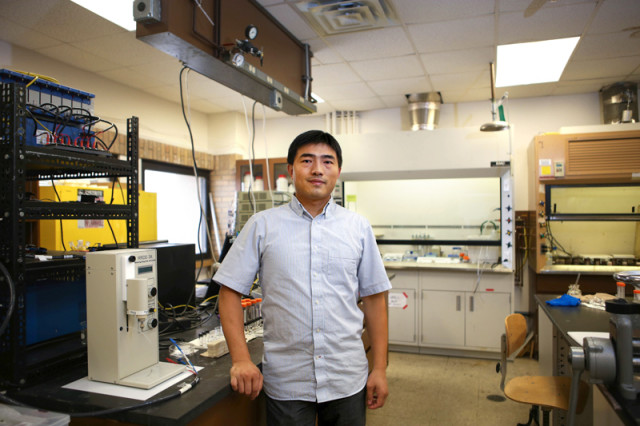UT Professor’s Super Gel Makes Him a Top Tech Innovator

Professor Guihua Yu in his University of Texas lab, where he’s developing a gel that could improve batteries and medical treatments. Photo by Ricardo Llamas/Reporting Texas
By Rachel Phua
For Reporting Texas
A super jelly being developed at the University of Texas at Austin resembles organic tissue and conducts electricity, promising to make batteries last longer and give doctors new tools to treat diabetes and other diseases.
That’s the hope of Guihua Yu, an assistant professor of mechanical engineering, who did postdoctoral research on the hydrogel at Stanford University before coming to UT in 2012. Yu, 33, was named in August as one of MIT Technology Review’s “35 Innovators Under 35.”
Started in 1999, the list has included the founders of Google, Facebook and Tumblr. The tally includes people “whose work has great potential to transform the world,” according to the magazine.
Jell-O is a simple hydrogel, and another version makes disposable diapers absorbent. Hydrogels are also key components in drug delivery systems, contact lenses and other products. Made of water and polymers—molecules strung together to form long chains—hydrogels have qualities of solids and liquids, but are neither.
Yu’s breakthrough is a hydrogel that carries electricity, opening the material to many more practical applications. Instead of trying to miniaturize existing technology, Yu says he built conductivity into the organic material by adding a substance that makes his gel conductive.
“Unlike the traditional top-down approach of trying to shrink down nanostructured materials to a molecular level, I’m trying to work with organic materials and build up the nanostructured gel from it,” Yu said.
The gel can store electricity and may be able to make batteries safer and more efficient, Yu said. Everything from mobile phones to electric cars could last years longer without sacrificing performance, he added.
Super jelly may have a future in biotech, too. The gel might be used to produce cheaper, more sensitive glucose sensors, he said. He is working on sensors that can simultaneously detect glucose, cholesterol and triglyceride levels.
The conductive gel responds to touch and could be used to make skin sensors, Yu said, or skin for robotic limbs that would respond to pressure.
Yu said he hopes commercial applications of the gel can be developed soon, and that he has talked with several high-tech companies about versions of the gel in commercial quantities. Patents on his work are also possible.
“Based on his very interesting research area,” said Les Nicholas, program director at UT’s Office of Technology Commercialization, “we will see how we can support his efforts going forward.”
Yu grew up in Putian, China, a coastal city about halfway between Hong Kong and Shanghai. His father, a chemical engineer who worked at sugar factories, often would bring him to work.
He graduated in 2003 from the University of Science and Technology in Hefei with a chemistry degree. He earned a doctorate in chemistry at Harvard University in 2009 and accepted a postdoctoral fellowship at Stanford later that year.
Yu said he came to UT because the mechanical engineering department was looking for a professor who worked with unique organic materials and because of the city’s reputation as a high-tech hub.
“Everyone knows Silicon Valley is in San Jose, but Austin is also home to the Silicon Hills, Yu said.
Yu has his own research group at UT and drives it hard.
“He is pretty intense in everything — research, our progress, even basketball — but I’ve learned so much from his willingness to guide us with our own research,” said Bradley Liu, one of his research assistants who is a graduate student in material science and engineering from China.
Arumugam Manthiram, director of the Cockrell School of Engineering’s Texas Materials Institute, said Yu’s work reflects well on the university.
“Yu’s productivity and creativity gave him his job at UT,” he said. “And it paid off.”